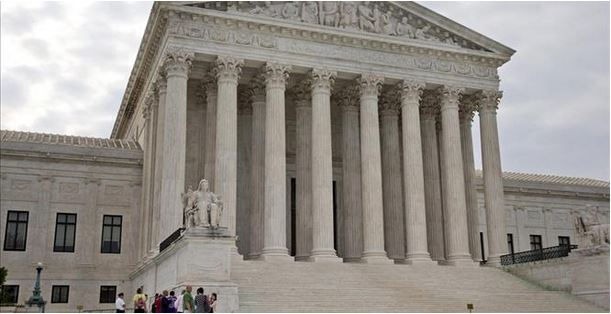Here is Clarke D. Forsythe writing at American Thinker (with emphasis added):
[P]ublic opinion data regularly show that Americans don’t understand the Supreme Court, or how it works, or the decisions it makes (e.g., Pew July 2010 poll).
…
The Constitution rests on the political doctrine — proclaimed in the Declaration of Independence — of government by the consent of the people. The basic framework includes a written constitution and republican (representative) government, separation of governmental powers — executive, judicial, legislative — with checks and balances, and a federalist structure, dividing power between a national and state governments.
In addition to being a comprehensive survey of constitutional history, The Constitution: An Introduction is also a timely challenge to the current dogma — widely supported in the law schools and by the legal profession today — of judicial supremacy (“whatever the Supreme Court says, goes.”). Can the Supreme Court legitimately bind the Presidency and the Congress, and all the states, by any decision, no matter how wrong? This is a question that has recurred with periodic intensity throughout American history.
The Constitution establishes constitutional supremacy, not judicial supremacy. “The Supreme Court’s decisions are not supreme over the Constitution itself,” the authors write, “and therefore cannot bind other responsible actors in the exercise of their independent constitutional responsibilities.”
…
The Constitution also distinguishes the judicial, executive and legislative powers and separates them. As James Madison wrote in Federalist #49: “The several departments being perfectly co-ordinate by the terms of their common commission, neither of them, it is evident, can pretend to an exclusive or superior right of settling the boundaries between their respective powers.”
The notion of “judicial supremacy” is contrary to the framers’ understanding of the judicial role. As Alexander Hamilton wrote in Federalist No. 78: “to avoid an arbitrary discretion in the courts, it is indispensable that they should be bound down by strict rules and precedents, which serve to define and point out their duty in every particular case that comes before them.” As Stanford Law Professor Michael McConnell has observed, “No one at the founding appeared to take the now popular academic view that the Constitution was deliberately framed in terms of heroic generalities precisely to give federal judges a wider scope for discretion.”
…
Judicial supremacy fundamentally contradicts self-government. By its comprehensive treatment of constitutional text and history, The Constitution: An Introduction makes clear what is at stake for self-government when the judiciary goes beyond its constitutional authority, though it cannot say whether or how Americans will effectively respond to keep judges within their constitutional limits.
Read more: American Thinker
Image credit: townhall.com.

